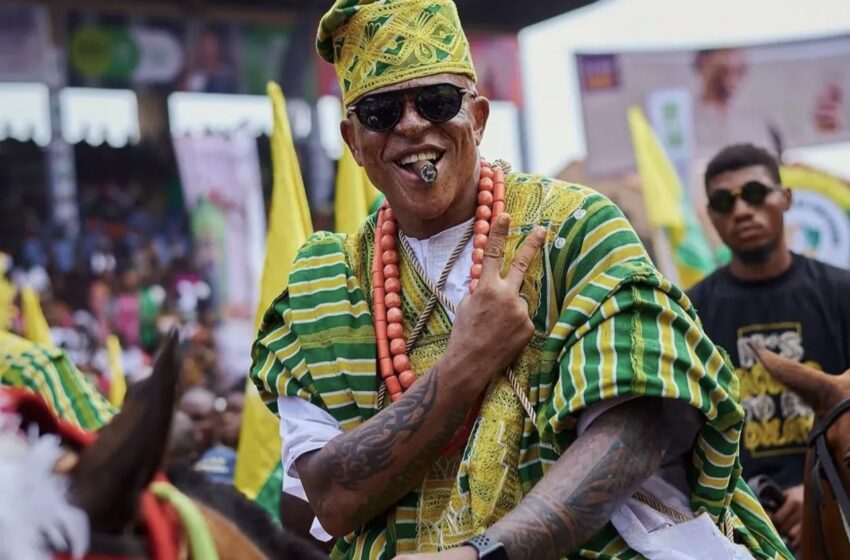Ojude Oba Festival: Origin, meaning, modern significance

Nigerian celebrity and Yoruba indigene at the 2025 Ojude Oba Festival. Photo Credit- NaijaHistory/X
The Ojude Oba Festival, meaning “The King’s Forecourt” in the Yoruba language, has its roots deeply embedded in the cultural and historical fabric of the Ijebu people of Ijebu-Ode, Ogun State, Nigeria. Its origins can be traced back to the 19th century, specifically around 1879, during the reign of Awujale Afidipote. This period marked the introduction and growth of Islam in Ijebuland, catalyzed by a slave named Alli (later known as Alli-Tubogun), who converted to Islam with the blessing of his master. This act of religious tolerance under Awujale Ademuyewo Afidipotemole allowed Islam to flourish, leading to the construction of local mosques by 1880 and a significant increase in converts by 1896.
The festival emerged as a form of gratitude from the Muslim community to the Awujale for granting them religious freedom without persecution. Initially, it was tied to the Eid al-Kabir (Ileya) celebrations, where Muslims rest on the second day post-festival and pay homage to the king on the third day. This practice evolved into an annual event, eventually transforming into the Ojude Oba Festival. Historical accounts, such as those from Wikipedia, note that Chief Balogun Kuku, a convert to Islam who could no longer participate in the pre-existing Odeda festival, initiated the Ita-Oba festival as a substitute, which later changed into the modern Ojude Oba. Oba Sikiru Kayode Adetona, the current Awujale, revitalized the festival in the 18th century by reintroducing age-grade groups (regberegbe), a tradition that has since become a cornerstone of the event.
The festival’s early form was a simple homage-paying ceremony, but it grew into a grand cultural spectacle, reflecting the Ijebu people’s resilience, enterprise, and beauty. It was documented as early as the late 15th century by Portuguese sources referencing the Ijebu kingdom, indicating a long-standing royal tradition that the festival builds upon.
RELATED STORIES
SPOTLIGHT: Bolanle, the Yoruba culture advocate preserving Nigeria’s history for future generations
Know your history, culture as leaders of tomorrow, Lagos commissioner charges youths
Implications of the Ojude Oba Festival in modern times
In 2025, the Ojude Oba Festival has evolved into a multifaceted event with significant cultural, economic, and social implications. The festival remains a vibrant celebration of Yoruba heritage, with participants donning elaborate traditional attire: agbada, gele, and coral beads, showcasing craftsmanship and status, as noted in the 2015 Sage Journals article by AbdulGafar Olawale Fahm. The regberegbe age groups, numbering over 20, continue to preserve Ijebu customs, with their parades and equestrian displays serving as a living museum of tradition.
The festival’s viral moments, such as Oreagba’s 2024 appearance, have elevated its international profile. The Conversation (2024) suggests it could become a tourism powerhouse, with potential revenue increases of 15-20% if promoted strategically, aligning with Governor Dapo Abiodun’s efforts to leverage cultural events for tourism, including the Digital Innovation Park launched in 2023.
With over 1 million attendees historically (Wikipedia), the festival boosts local economies through trade in textiles, food, and services. Social media posts highlight tailors, jewelers, and transporters benefiting, while sponsors like Globacom and First City Monument Bank extend financial and infrastructural support, as per ResearchGate’s 2025 study.
The festival unites Ijebu indigenes globally, reinforcing allegiance to the Awujale and fostering intergenerational communication, as Owusu-Frempong (2005) cited in the Sage Journals article. The 2025 posts celebrate family participation, like the Akin Faminu clan, emphasizing social cohesion.
Governor Abiodun’s promotion of the festival as a cultural tourism asset aligns with his administration’s development agenda, potentially enhancing his political capital. The presence of figures like the Honourable Minister of Art, Culture, Tourism, and the Creative Economy, Hannatu Musawa, shows its national significance.
Conclusion
The Ojude Oba Festival’s origins in 19th-century Islamic tolerance and royal patronage have blossomed into a modern cultural grand celebration. It preserves Ijebu heritage while adapting to contemporary trends. Economically, it drives local growth and socially, it strengthens community bonds.

